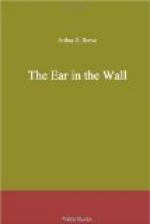XXVII
THE ELECTION NIGHT
It was election night. Kennedy and Carton had arranged between them that we were all to receive the returns at the headquarters of the Reform League, where one of the papers which was particularly interested, had installed several special wires.
The polls had scarcely closed when Kennedy and I, who had voted early, if not often, in spite of our strenuous day, hastened up to the headquarters. Already it was a scene of activity.
The first election district had come in, one on the lower East Side, which was a stronghold of Dorgan, where the count could be made quickly, for there were no split tickets there. Dorgan had drawn first blood.
“I hope it isn’t an omen,” smiled Carton, like a good sport.
Kennedy smiled quietly.
We looked about, but Miss Ashton was not there. I wondered why not and where she was.
The first returns had scarcely begun to filter in, though, when Craig leaned over and whispered to me to go out and find her, either at her home, or if not there, at a woman’s club of which she was one of the leading members.
I found her at home and sent up my card. She had apparently lost interest in the election and it was with difficulty that I could persuade her to accompany me to the League headquarters. However, I argued the case with what ability I had and finally she consented.
The other members of the Ashton family had monopolized the cars and we were obliged to take a taxicab. As our driver threaded his way slowly and carefully through the thronged streets it gave us a splendid chance to see some of the enthusiasm. I think it did Margaret Ashton good, too, to get out, instead of brooding over the events of the past few days, as she had seen them. Her heightened colour made her more attractive than ever.
The excitement of any other night in the year paled to insignificance before this.
Distracted crowds everywhere were cheering and blowing horns. Now a series of wild shouts broke forth from the dense mass of people before a newspaper bulletin board. Now came sullen groans, hisses, and catcalls, or all together, with cheers, as the returns swung in another direction. Not even baseball could call out such a crowd as this.
Enterprising newspapers had established places at which they flashed out the returns on huge sheets on every prominent corner. Some of them had bands, and moving pictures, and elaborate forms of entertainment for the crowds.
Now and then, where the crowd was more than usually dense, we had to make a wide detour. Even the quieter streets seemed alive. On some boys had built huge bonfires from barrels and boxes that had been saved religiously for weeks or surreptitiously purloined from the grocer or the patient house-holder. About the fires, they kept an ever watchful eye for the descent of their two sworn enemies— the policeman and the rival gang privateering in the name of a hostile candidate.




